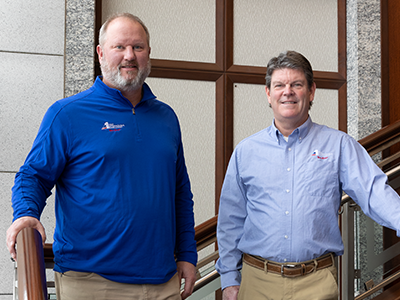
“Live first.”
First International Bank & Trust’s approach to community banking is expressed in this seemingly simple yet often complex summary of the work-life balance FIBT desires for its employees.
This individualized approach, along with the steady community leadership the Stenehjem family has adopted during the past 110 years, has successfully laid the cultural foundation for the $4.7 billion, Watford City, N.D.-based bank’s expansion across the Midwest and Southwest. In 2021 alone, FIBT announced its move into Sioux Falls, S.D., via acquisition of a mortgage brokerage, and into the Twin Cities by opening a branch in Edina, Minn.
‘They want to be here’
The “live first” approach immediately struck a chord with FIBT Twin Cities Market President Mitch Cook and Edina Branch President Kyle Kray during their job interviews.
“Whatever it means to you,” Cook said bank executives told him. “They don’t tell you what it means; it’s what it means to you — very different, not didactic.”
As one of nearly a half dozen FIBT regional presidents, Cook is the visionary for the Twin Cities market, and will lead future growth in the region. As the branch president, Kray is tasked with growing the branch and ensuring staffing is maintained. Currently, the Edina branch has eight employees whose main focus has been on commercial banking. The branch is in an attractive setting in the Centennial Lakes Office Park: The bank’s interior is well-lit and modern. Restaurants, a city park, 18-hole mini golf course and 10-acre lake used for ice skating in the winter are all a short stroll from the office.
As a new bank in the Twin Cities area, FIBT faces a challenge with brand recognition. Cook himself had never heard of FIBT before interviewing. But Cook and Kray are longtime Twin Cities bankers who’d built relationships over the decades. Customers who are well-served by their bankers tend to give new institutions a careful look when those bankers change jobs; some have already reached out to learn more about FIBT, which because of its credit culture offers its lenders an ability to close larger deals than they would previously. (On the day of his interview, Cook had just closed the largest loan of his career.)
Relationships are built on service and access: All of Cook’s customers have his cellphone number. During the pandemic (and even before) the pair frequently worked long hours to help their customers secure needed financing to ensure their solvency. Being available at any hour makes positive, lasting impressions. Cook and Kray have adopted an “in their best interests” approach with their customers: They tell prospects if another bank has a better deal for them.
As FIBT newbies, Cook and Kray both feel supported by bank leadership, including Peter Stenehjem, president, and his father, Stephen Stenehjem, CEO and chair, despite being hundreds of miles away from FIBT headquarters. That care was especially evident the week before the Edina branch opened.
Cook wasn’t sure the bank would open on time, but FIBT sent a team of IT and facilities professionals to the Twin Cities; they worked late to ensure the opening deadline last August was met, while remaining positive during that stretch of long days. Since the branch has opened, Edina employees have received company shirts, and branded mugs and coolers, tokens of appreciation which help cement their sense of belonging.
“The most successful places or organizations I have ever been a part of don’t spend a lot of time talking [about] culture because it’s understood and inherent,” Kray added. “And we don’t even have to talk about it here. We knew that from Day One. It was built in.”
The company’s onboarding process, including compliance training, fosters this culture. Perhaps even more importantly, the bank seeks personable employees who are willing to be “utility players,” and undertake multiple tasks to help the team.
“They let their players play,” Kray noted.
“The culture here was very refreshing when we started … it’s all very, very true,” Cook added. “I think it’s a big deal that this bank is privately held … after I met these guys and started [work] I said, ‘You know what? These guys do what they want because they can.’ And they are very community-focused. They have a lot of locations in small communities in North Dakota, and they really take care of those communities. And they invest — it’s not just donating money.”
As was common after Covid-19 emerged, the teams at FIBT transitioned to remote work across the bank’s footprint. And like their banking peers, the lending team overcame the challenges introduced during the rollout of the Paycheck Protection Program; the bank allocated more than $310 million to businesses seeking support. Throughout, the bank maintained relationships by connecting through Zoom and hosting virtual happy hours.
Bank employees here feel appreciated, said Cook. “We’re all fully equipped to work from home … none of these people do,” Cook said. “They want to be here.”
 First International Bank & Trust employs approximately 800 people across 31 branches in North Dakota, South Dakota, Minnesota and Arizona. In addition to offering standard commercial banking services, the bank operates an electronics payments fintech product called Kotapay.
First International Bank & Trust employs approximately 800 people across 31 branches in North Dakota, South Dakota, Minnesota and Arizona. In addition to offering standard commercial banking services, the bank operates an electronics payments fintech product called Kotapay.
FIBT was chartered as Farmers State Bank in 1910 in Arnegard, N.D. In 1934, the family moved its headquarters to Watford City and changed its name to First International. It was the only bank in its county to survive the Great Depression.
In 1995, FIBT branched into Arizona, where it operates in Phoenix its suburbs: Scottsdale, Chandler, Gilbert and Mesa.
Today, FIBT plays an important role in the economy of western North Dakota. The bank’s headquarters is near the Bakken and Three Forks Formation, one of the largest oil reserves in the United States. FIBT offers mineral appraisals, oil and gas asset sales, consulting and reserve-based lending services. The bank acquired Krown Energy Group in 2020, which enables mineral-rights owners to map, track and organize wells, and forecast future revenue and production.
